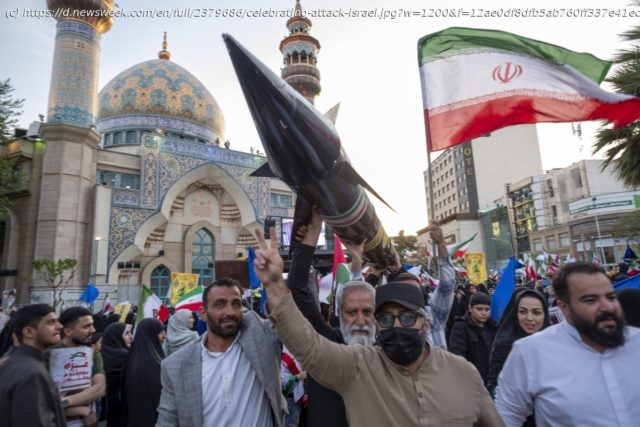Iran’s attack on Israel was not a surprise, nor did it inflict significant damage. It was nonetheless a paradigm shift.
Iran’s attack on Israel was not a surprise, nor did it inflict significant damage. It was nonetheless a paradigm shift. This was the first long-distance, large-scale drone strike in history and the first time Iran attacked Israel directly rather than through proxies. The attack was a reminder of Tehran’s longstanding enmity and a call to reexamine our approach to the Islamic Republic.
Iran’s hostility is not new. Some may have forgotten that in 1979, Iran’s revolutionary government seized the American Embassy in Tehran and held 53 diplomats hostage for more than a year. Since then, the United States and Iran have been engaged in a proxy war that we are not winning. While there have been periods of calm, Tehran has never given up on three long-term goals: expanding its regional influence, driving the U.S. out of the Middle East and destroying Israel. To achieve these objectives, Iran’s Islamic Revolutionary Guard Corps (IRCG), assembled a collection of militias, including Hezbollah in Lebanon; Hamas in Palestine; the Houthis in Yemen; and Iraq’s Popular Mobilization Force or Hashd al-Shaabi. Some of these groups have been attacking American interests and allies for more than 40 years.
Recall that in 1983 Hezbollah bombed the American Embassy in Beirut killing 63. Six months later, Hezbollah attacked the Marine barracks in Beirut, killing 241 in the largest single-day loss of life for the Marine Corps since the Battle of Iwo Jima in World War II. In 1996 the IRCG and a collection of Saudi Shia terrorist groups, including Hezbollah in the Hejaz, destroyed the U.S. Air Force barracks in Al Khobar, Saudi Arabia, killing 19 airmen. Between 2003 and 2011, hundreds of Americans died in Iraq because of improvised explosive devices provided by Iran. In 2015 Saudi Arabia and the UAE went to war, not to conquer Yemen, but to keep Iran from establishing a foothold on the Arabian Peninsula. They failed in part because the U.S. withdrew the munitions, logistics and intelligence support it had initially provided. In 2020, the United States killed IRCG Commander Qasem Soleimani in a drone strike that shocked Iran’s leadership.
In more recent months, Iranian proxies have launched dozens of attacks on American troops in Syria, Jordan, and Iraq, killing several while the Houthis continue to launch missiles at American warships in the Red Sea. National Security Advisor Jake Sullivan has warned state governors of potential Iranian cyber-attacks on their critical infrastructure systems. Thus, the threat posed by Iran’s current government did not materialize over the weekend, but it is becoming ever more dangerous as Tehran advances towards acquiring nuclear weapons.
Regrettably, Western non-proliferation policy has failed to deter Iran’s nuclear ambitions, just as it failed with India, Pakistan, and North Korea. Nor have covert activities such as assassinating scientists or cyber-attacks on nuclear enrichment facilities succeeded. Iran now possesses significant quantities of near-weapons-grade uranium and the capacity to quickly complete the process, if it has not already done so. Iran has also made significant advances in ballistic missile technology. What it still appears to lack is the actual mechanism for placing a bomb in a missile.
As was the case with the Indian and Pakistani nuclear programs, our intelligence on Iran’s progress is far from complete, but it now appears to be a matter of when, not if, Iran will become a nuclear power. A nuclear-armed Iran will pose an existential threat to Israel. It will extend a strategic umbrella over Iranian proxies in southern Lebanon, Gaza, Yemen, and Iraq. It will give Iran much greater leverage over the pro-Western Gulf states and traditional Western allies Egypt, Jordan, and Turkey. The likelihood of a regional arms race will increase dramatically. Saudi Arabia has already declared that it will develop its own nuclear weapons if Iran does.
There is little point in debating what we should have done in the past. The relevant question is how we should deal with Iran now. Launching another Middle East war is not a good option. After humiliating fiascos in Iraq and Afghanistan, the American people have no appetite for invading Iran. As we have seen with the Houthis, short, sharp blows have lost their deterrent effect. Even a massive blow is unlikely to change the policy of a regime that endured eight devastating years of war with Iraq.
Destroying Iran’s oil fields will raise global oil prices. Moreover, the Iranians are not the Houthis. They have a much more robust capability to strike back at American interests and our oil-producing Gulf allies. The reaction of Russia to an attack on its newest ally is uncertain. Yet perhaps the worst outcome of direct military action against Iran would be its immediate effect of uniting the Iranian people behind a government many of them have long opposed.
Negotiating with the ayatollahs is no more likely to change their behavior than bombing them.
The Iranian regime remains a revolutionary power intent on disrupting the status quo and using Shia Islam to expand its influence across the Middle East. Conciliatory gestures will not pacify a regime that has made hostility towards the U.






